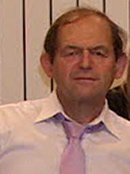
Plenary Lecture
Probability, Fuzzy Sets, Generalizations and Relative Theories

Professor Michael Gr. Voskoglou
Mathematical Sciences
School of Technological Applications
Greece
E-mail: voskoglou@teiwest.gr, mvosk@hol.gr
Abstract: A few (50-60) years ago Probability Theory, based on the laws of the traditional bi-valued logic, used to be the unique tool in hands of the experts for dealing with situations of uncertainty frequently appearing in problems of science and technology and in the everyday life. However forms of multi-valued logic have been studied since the 1920s, notably by the Polish philosopher Jan Lukasiewicz, by the Polish-Jew logician and mathematician Alfred Tarski and by others. Nevertheless, the turning point was the 1965 proposal of the concept of Fuzzy Set (FS) by Lofti Zadeh that gave genesis to Fuzzy Logic (FL), an infinite-valued logic in which the truth values of variables may range between completely true (1) and completely false (0). FL opened the door to construction of mathematical solutions of problems stated in a natural language and having no precise or uncertain data, in cases where probability theory has not the capability to do so. Zadeh introduced also the Fuzzy Numbers (FNs) as a special form of FSs on the set of the real numbers and the basic arithmetic operations on them. FNs play an important role in fuzzy mathematics analogous to the role of the ordinary numbers in the traditional mathematics. Several efforts have been made through the years to improve the FS theory. In 1975 Zadeh generalized the ordinary FS, otherwise named as type-1 FS, to the type-2 FS, so that more uncertainty can be handled connected to the membership function. The theory of type-2 FS was further improved in the late 1990s by Prof. Jerry Mendel and his students and as a result more and more researchers around the world are working on it nowadays. Atanassov introduced in 1986, as a complement of Zadeh’s membership degree (M), the degree of non-membership (N) and defined the intuitionistic FS. Smarandache introduced the degree of indeterminancy/neutrality (I) in 1995 and defined the neutrosophic set in three components (M, N, I), where M, N and I are subsets of the interval [0, 1]. Complex FS were further introduced by Ramon, Milo, Friedman and Kandel in 2002, whose membership function is defined on the complex plane. Relative theories have been also proposed as alternatives to the FS theory; by Deng in 1982 (Grey Systems), by Pawlak in 1991 (Rough Sets), by Molodtsov in 1999 (Soft Sets) and by others. In this lecture all the above generalizations and relative to the FS theories will be discussed and compared to each other by listing their advantages and disadvantages
Brief Biography of the Speaker: Michael Gr. Voskoglou (B.Sc., M.Sc., M. Phil., Ph.D. in Mathematics) is currently an Emeritus Professor of Mathematical Sciences at the School of Technological Applications of the Graduate Technological Educational Institute (T. E. I.) of Western Greece. He served as a full Professor in the same Institute from 1987 to 2010. He used to be also an instructor at the Hellenic Open University, at the Mathematics Department of the University of Patras, at the Schools of Primary and Secondary In – Service Teachers’ Training in Patras and a teacher of mathematics of the Greek Public Secondary Education (1972-1987). He was appointed, under sabbatical, as a Visiting Researcher at the Institute of Mathematics and Informatics of the Bulgarian Academy of Sciences in Sofia for three years (1997-2000). He has lectured as a Visiting Professor in M.Sc. courses of the School of Management at the University of Warsaw (2009), of the Department of Operational Mathematics at the University of Applied Sciences of Berlin (2010).and of the Mathematics Department at the National Institute of Technology of Durgapur, (2016) under a grant of the GIAN program of the Indian Government. He is the author of 14 books in Greek and English language and of about 500 papers published in reputed journals and proceedings of conferences of more than 30 countries in the five continents around the world, with many citations from other researchers (Google Scholar report 2019: 1318 citations, h – index = 19). He is the Editor in Chief of the “International Journal of Applications of Fuzzy Sets and Artificial Intelligence” (ISSN 2241-1240, Impact Factor: SJIF 3.806, Universal 28.4587), reviewer of the American Mathematical Society (No. 60147) and member of the Editorial Board or referee in many international and national mathematical journals. He has conducted five programs of technological research on applications of quantitative methods to Management (1989 – 1997), he has supervised several student dissertations on mathematics applications to Economics and Engineering and he has been external examiner of Ph.D. dissertations in universities of Egypt, India and Saudi Arabia. He is the recipient of many scholarships, distinctions and honorary awards (Who is Who in the World 1996 and in America 1997, International Einstein Award 2009, Medal of the Egyptian Computer Scientific Society 2018, etc.). His research interests include Algebra, Markov Chains, Fuzzy Logic, Artificial Intelligence and Mathematics Education.